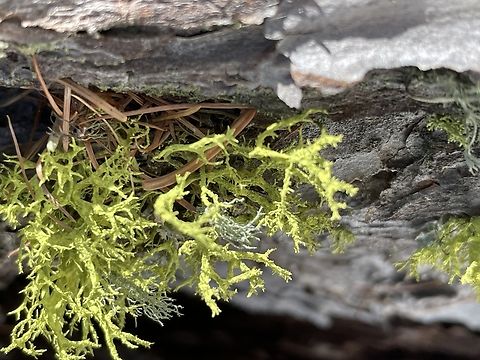
Appearance
The thallus, or vegetative body, has a fruticose shape — that is, shrubby and densely branched — and a bright yellow to yellow-green, or chartreuse color, although the color will fade in drier specimens. Its dimensions are typically 2 to 7 cm in diameter. The vegetative reproductive structures soredia and isidia are present on the surface of the thalli, often abundantly.Naming
The closely related "Letharia columbiana" lacks isidia and soredia, usually bearing instead apothecia. It is also less branched than "L. vulpina".Distribution
"Letharia vulpina" occurs throughout the Pacific Northwest. It is often abundant on exposed branches that have lost their bark. In old, moist forests, it is typically found in drier areas. This species has an intermediate air pollution sensitivity. In the Rocky Mountains, "Letharia" species are found in ponderosa forests at the prairie-forest boundary at relatively low elevations though medium and high elevation Douglas fir and lodgepole pine forests.Uses
Some Plateau Indian tribes used wolf lichen as a poultice for swelling, bruises, sores, and boils, and boiled it as a drink to stop bleeding.The brightly coloured fruiting bodies are popular in floral arrangements.
References:
Some text fragments are auto parsed from Wikipedia.